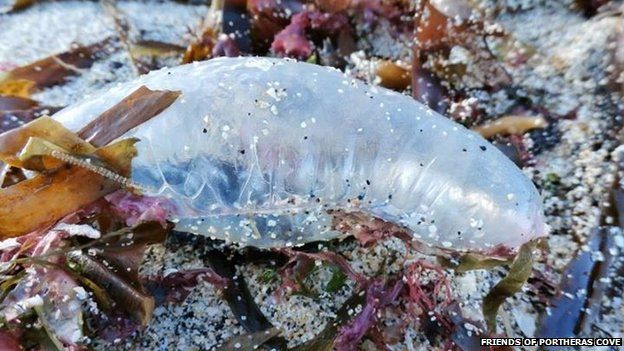Portuguese man-of-war washed up at Portheras Cove, Cornwall
- Published

People are being warned to take care after a Portuguese man-of-war washed up on a beach in Cornwall.
The eye-catching but potentially dangerous floating sea creatures are only occasionally reported in the UK.
Their tentacles can give a painful sting if they are touched, even if out of water.
It was spotted at Portheras Cove between St Ives and Sennen Cove on Thursday 30 July.
Delia Webb, a biological scientist and spokesperson for Friends of Portheras Cove, said she was delighted at the discovery.
Powerful venom
She said: "They're beautiful creatures, but when they get stranded on a beach or they're not in the water, children can think they're balloons or something else.
"They don't actually realise they've got a powerful sting and they can be dangerous even after they've been stranded. The venom is quite powerful."
Peter Richardson from the Marine Conservation Society urged people not to touch them if they see one.
"They can pack a very powerful sting," he said. "In some parts of the world those stings have been fatal, but not in the UK."
He asked people to report any sightings.
A few of the sea creatures were reported on beaches in south west Cornwall towards the end of 2012.
They are made up of a colony of many tiny marine organisms living together called hydrozoans.
NHS advice states that anyone stung should seek immediate medical assistance if severe lasting pain is experienced, or if the affected area becomes infected.
- Published17 September 2012
- Published7 September 2012
- Published31 August 2012